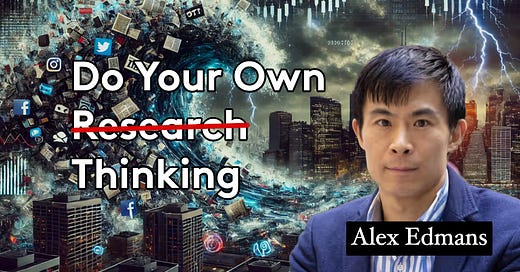🎧 Investing in a Post-Truth World - Alex Edmans (1/2)
The Golden Age or Gilded Age of Investing, 2025 sure feels like it's a new "Age".
It’s all happening very fast. This year I already posted about the importance of narratives and how attention is so competitive that narratives need to be supercharged in the style of the WWE. But that was before I heard of the perfect example of monetizing storytelling and attention: the $TRUMP coin!
If you are not tired of it and want to read more, here are a few articles from smart people on this topic: Simon Taylor, Nick Maggiulli, Lumida.
Instead of adding my own, I will share some highlights from an interview recorded before all that, but that is particularly relevant: It’s from the podcast episode “Investing in a Post-Truth World” with Alex Edmans. This conversation was inspired by Alex’s book May Contain Lies and it will help keep you sane and prosperous in 2025!
Listen to the conversation on every podcast platform; watch it on YouTube; or keep reading (NB: these are personal thoughts based on the conversation, mostly written by AI).
Investing in a Post-Truth World
The concept of “Post-Truth” is not new; it comes from Alex’s 2017 Ted Talk, which has been watched over 2 million times.
It’s also not specific to investing, but the challenge has always been inherent to investing because it’s not tangible. If it’s a product or service, you can test it, taste it, and experience it, so it’s hard to be completely delusional about its true nature. In the sphere of investment, where data is abundant yet often misleading
Navigating the Post-Truth Era
"Post-Truth", as Alex explains, is characterized by adherence to beliefs that align with personal desires rather than objective truth. In the realm of investing, this mindset can lead to embracing popular but unverified beliefs, such as the supposed financial superiority of ESG investments without rigorous data backing these claims (the second part of my conversation with Alex is about ESG). He highlights the need for investors to be skeptical of convenient narratives and to critically evaluate the robustness of supporting data.
Combating Misinformation
The fundamental battle against misinformation begins within us. It is common to attribute the spread of misinformation to external entities like social media platforms, but the real transformation occurs when individuals scrutinize their own biases. Edmans stresses the power of internal change, advocating for individuals to question their own predispositions and desires. For example, when confronted with studies that seem favourable, it’s crucial to maintain the same level of scrutiny as when we initially dislike them.
The Role of Narratives and Data
The debate over stories versus data is age-old, but instead of going full on “rational”. Edmans suggests a balanced approach. While narratives can captivate and persuade, they often lack the empirical weight necessary for sound judgments. Instead, he encourages merging storytelling with concrete data to form a compelling yet trustworthy picture. His writings, full of illustrative anecdotes supplemented by thorough research, exemplify this dual approach. This method allows investors to enjoy narratives while remaining anchored in factual accuracy. It’s not just theory - If you follow him, you can see how he masterfully posts using hooks and stories.
Climbing the Inference Ladder
To make informed investment decisions, investors should employ layers of critical thinking. The initial engagement layer—comprising headlines and quick summaries—attracts attention but should lead to deeper inquiry. Alex’s framework, known as the "inference ladder," provides a systematic method for investors to question and validate claims methodically. The process moves from distinguishing statements from facts, facts from data, and further, highlighting the importance of recognizing each element’s limitations in representing truth.
Empowerment through Awareness
The democratization of investing has made it more accessible, but it requires vigilance from investors to separate hype from reality. By recognizing personal biases and employing critical analysis, investors can navigate misinformation adeptly. Alex's practical guidance extends beyond finance, offering a framework for discerning truth in any context.
This approach, look a lot more useful than the usual advice to “Do Your Own Research (DYOR)” or “read the disclaimer”.
Beyond investment, critical thinking serves as an essential life skill. Alex encourages applying these principles across various domains, from evaluating health advice to everyday decision-making. His broader message is empowerment: equipping oneself with the cognitive tools needed to discern reality from fabrication can yield significant benefits in personal and professional realms alike.
Next week I will share highlights from the second part of our conversation focused on ESG investing, but you can already watch it here.
My channels
Investorama - Separating Investment Facts from Financial Fiction
Investology - Re-Think Investment Management
Educational resources on Alternative Investing
A curation of Alternative Investment startups
Alternative Investment courses
Some tools I use (affiliate links)
Descript: for editing videos, podcasts, and using them as the foundations for articles
Wise: for paying in different currencies and earning on cash balances
Useful links for Brands, Marketers & Podcasters
Orama (my business): helps brands grow with podcasts & videos




